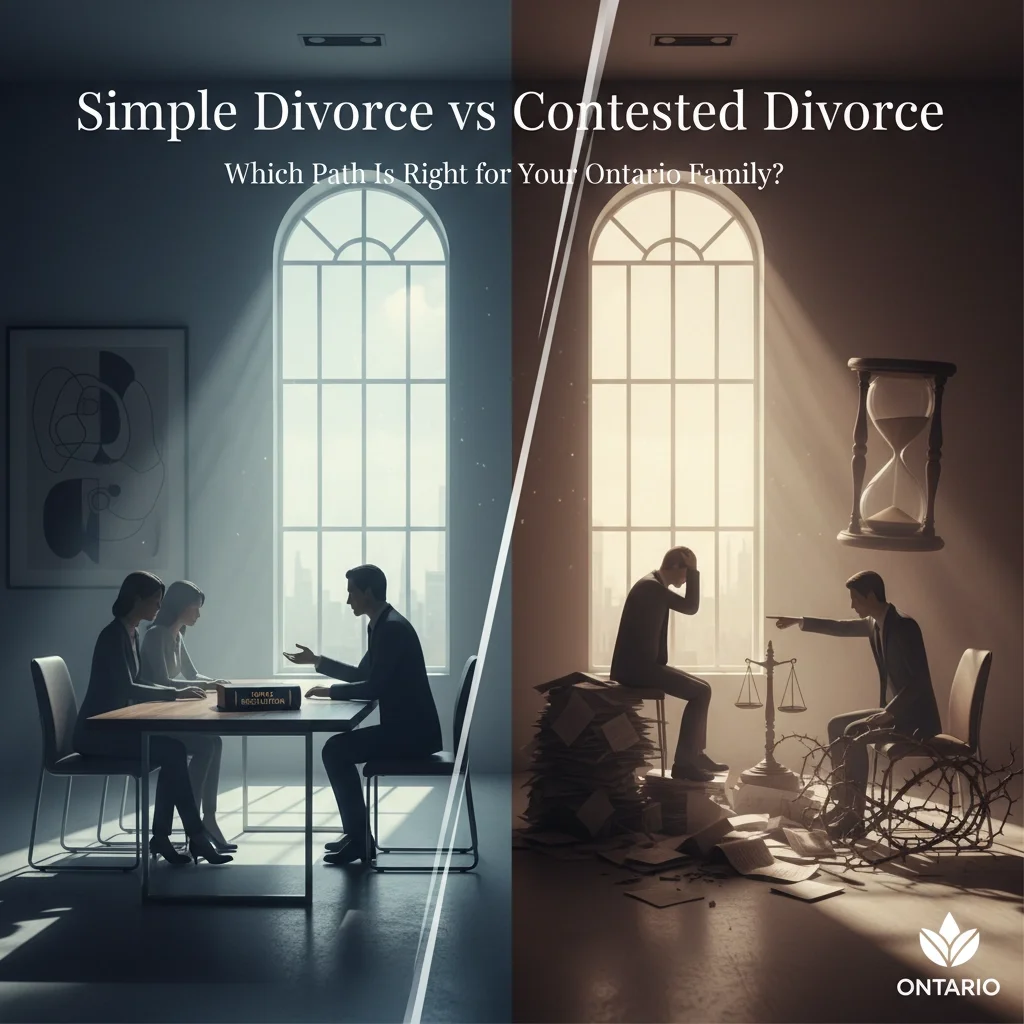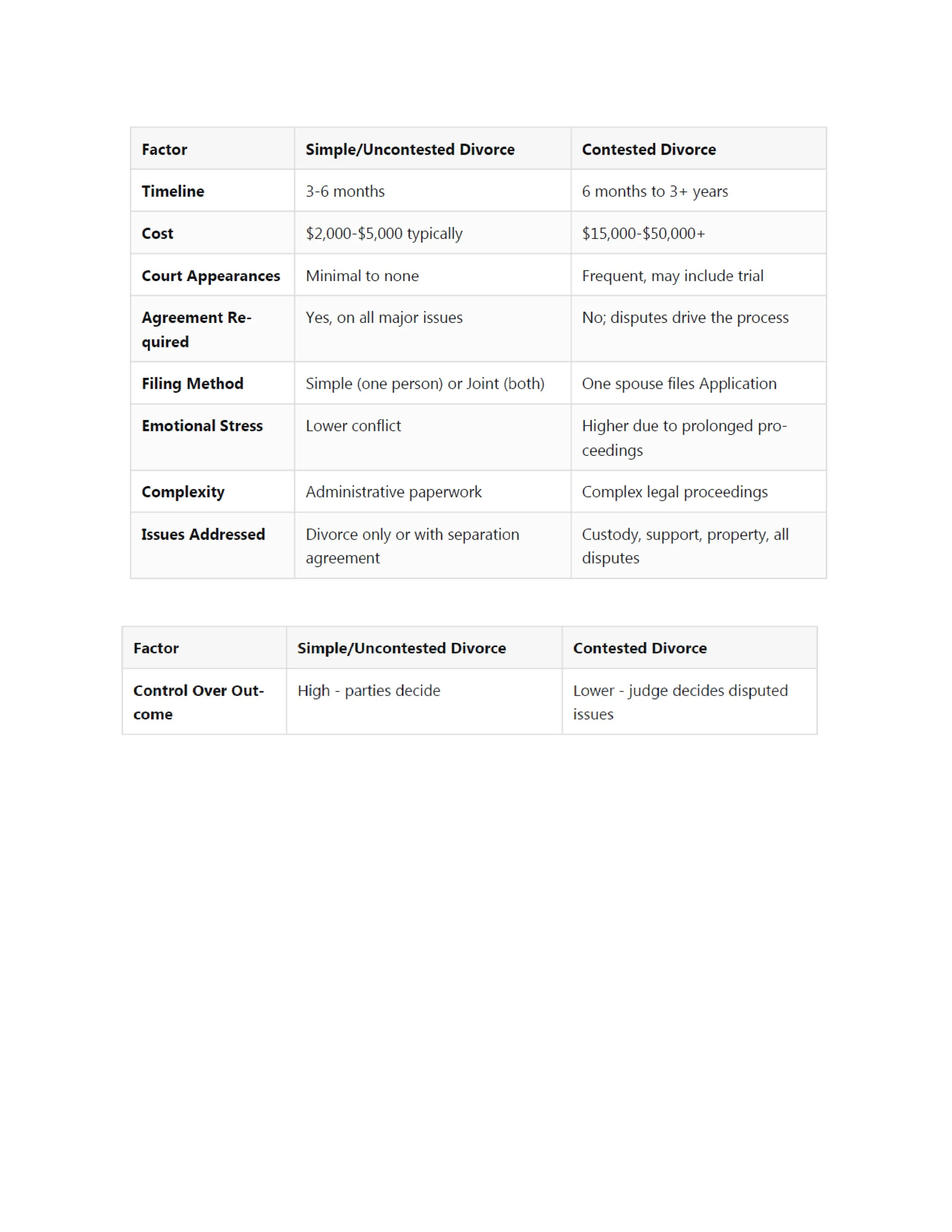Simple Divorce vs Contested Divorce: Which Path Is Right for Your Ontario Family?
When your marriage reaches its end in Ontario, you face a critical decision that will impact your timeline, costs, and stress levels for months or even years ahead. Understanding the fundamental differences between simple (uncontested) and contested divorces is essential for choosing the path that best serves your family's unique circumstances.
The distinction comes down to agreement. Simple and uncontested divorces occur when both parties agree on the divorce itself and all related matters, or when one spouse files for divorce and the other doesn't contest it. Contested divorces arise when spouses disagree on key issues like child custody, spousal support, property division, or the matrimonial home.
In Ontario, there are technically three types of divorce applications: Simple (filed by one person), Joint (filed by both together), and Contested (involving disputes). Both Simple and Joint divorces fall under the uncontested category, representing collaborative approaches to ending a marriage.
Simple/Uncontested Divorce: The Streamlined Approach
Core Strengths
An uncontested divorce represents the fastest and most cost-effective route to finalizing your divorce in Ontario. The process is primarily administrative, focusing on paperwork rather than courtroom battles. This approach works when both parties can maintain civility and reach agreements on all major issues.
Key Advantages
Speed and Efficiency
Uncontested divorces can be completed in just a few months, depending on how quickly you file paperwork and the court processes your application. This timeline assumes all documentation is properly completed and there are no complications requiring additional court review.
Significant Cost Savings
The financial benefits are substantial. Uncontested divorces cost significantly less than contested proceedings, especially when handled through flat-rate divorce services. You can even file online with a $224 court fee to start the process.
Reduced Emotional Stress
By avoiding prolonged litigation, uncontested divorces minimize conflict and emotional trauma for both spouses and any children involved. The process focuses on resolution rather than adversarial proceedings.
Filing Flexibility
You have two options for uncontested divorces:
Simple Divorce: One spouse initiates the process and serves the other spouse, who can choose not to participate
Joint Divorce: Both spouses collaborate on the application, which can simplify paperwork and reduce processing time
When Simple Divorce Works Best
A simple divorce is appropriate when:
You and your spouse have resolved all family law matters through a separation agreement
There are no children or joint assets requiring division
No disagreements exist over spousal support, child support, custody, or property
Your spouse is unlikely to contest the divorce proceedings
You want to avoid further litigation or lengthy negotiations
Important Limitations
Simple divorces are not suitable if you have unresolved issues related to child custody, spousal support, or property division. If your spouse is likely to contest the divorce or if significant disagreements remain, you'll need to consider the contested route.
Contested Divorce: When Court Intervention Is Necessary
Core Strengths
Contested divorces exist to resolve legitimate disagreements that require legal intervention and court oversight. They ensure that disputed matters are properly adjudicated through the judicial system when parties cannot reach independent agreement.
The Reality of Contested Proceedings
Extended Timelines
Contested divorces can take months or even years to complete. The timeline depends on the complexity of issues, court availability, and how reasonable both parties and their legal counsel are during negotiations.
Substantially Higher Costs
The financial impact is significant due to lawyer fees, court time, expert witnesses, and prolonged proceedings. Multiple court appearances, case conferences, settlement conferences, and potentially trial add to the expense.
Complex Legal Process
Contested divorces require resolution of disputed issues before the court will grant a divorce order. This may involve mediation, case management, and multiple court appearances.
Greater Emotional Toll
Prolonged litigation increases conflict and stress for all parties, including children. The adversarial nature can damage relationships and make post-divorce cooperation more difficult.
Court Requirements
To obtain a contested divorce in Ontario, the court must be satisfied that:
Both parties have been living separate and apart for at least one year (this can include living in the same household with no chance of reconciliation)
Issues relating to children and finances are resolved before granting the divorce order
Legal Grounds for Divorce in Ontario
Both simple and contested divorces require establishing one of three legal grounds:
Separation: Living apart for at least one year with no possibility of reconciliation
Adultery: One spouse has engaged in a sexual relationship outside the marriage
Cruelty: Physical or mental cruelty that makes continued cohabitation intolerable
The separation ground is most commonly used, as it doesn't require proving fault and simply requires the passage of time.
Comprehensive Comparison
Making the Right Choice for Your Family
Choose Simple/Uncontested Divorce If:
Both you and your spouse genuinely agree on ending the marriage
You've resolved disputes regarding child custody, support, and property division through negotiation or a separation agreement
You want to minimize costs and complete the process quickly
You prefer to avoid prolonged court involvement
You can communicate reasonably with your spouse despite the relationship ending
Your priority is maintaining stability for children and moving forward peacefully
Consider Contested Divorce If:
Fundamental disagreements exist on child custody arrangements or primary caregiving responsibilities
Significant disputes involve property division, the matrimonial home, or business assets
One spouse seeks substantial spousal or child support that the other disputes
Allegations of adultery or cruelty are contested
Your spouse contests the divorce application itself
Power imbalances or communication breakdown make fair negotiation impossible
Child safety concerns require court intervention
The Hybrid Approach: Starting Uncontested
Many families benefit from attempting mediation or collaborative negotiation before proceeding to full contested divorce proceedings. This approach can sometimes convert a potentially contested situation into an uncontested one, capturing the benefits of reduced costs and faster timelines while ensuring all issues are fairly addressed.
Professional mediation services can help couples work through disagreements and reach mutually acceptable solutions without the adversarial nature of contested proceedings.
Getting Professional Guidance
The choice between simple and contested divorce isn't always clear-cut. Your circumstances may change during the process, or you may discover issues you hadn't initially considered. Working with experienced family law professionals ensures you understand your options and make informed decisions.
At OMNI LAW GROUP, our family law team helps Ontario families navigate divorce proceedings efficiently and effectively. Whether your situation calls for a straightforward uncontested divorce or requires the complex litigation of contested proceedings, we provide the guidance you need to protect your interests and move forward.
The path you choose for your divorce will significantly impact your family's future. Take time to honestly assess your situation, consider your priorities, and seek professional advice to ensure you're making the best decision for your unique circumstances.
Don't let uncertainty delay important decisions about your family's future. Contact OMNI Law Group today to discuss your divorce options and develop a strategy that serves your family's best interests.






